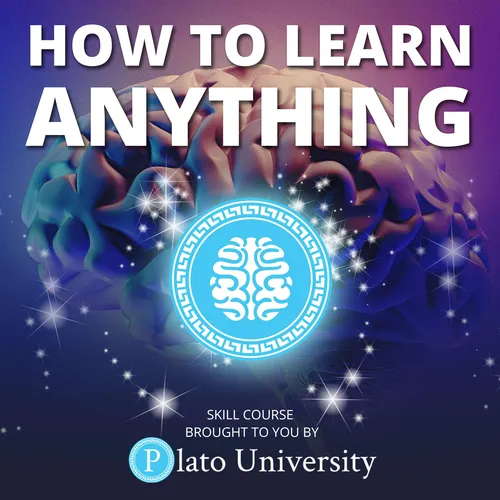
How to Learn Anything
Learn the science based tools of pro learners to become smarter, remember more, and master any hard skills. Even if you don't think your smart, we will show you how to learn ANYTHING you want and gain a competitive edge, personally and professionally. These are the secret techniques they didn't tell you in school. In just 35 days, you will develop accelerated learning strategies, memory techniques, and paths to mastery that will make you successful for the rest of your life.
If you're passionate about changing your life with learning, then join for FREE at Plato.University/courses/learning to get exclusive access to lesson content, worksheets, coaching, and a learning community.
How to Learn Anything is a skill course brought to you by Plato University.
- Update frequency
- every day
- Average duration
- 11 minutes
- Episodes
- 35
- Years Active
- 2022

Day 34 - How to Review the Results of Your Learning Plan
Today we discuss the final step in our learning process which is to review our entire learning plan and decide what we want to do with the knowledge we just learned.
In this course you will learn the…

Day 33 - How to Monitor and Adjust Your Learning Plan
Today we discuss the importance of monitoring your learning plan as you engage in learning sessions, then adjusting when necessary. We also cover how to monitor you learning plan quantitively and qua…

Day 32 - Learning Technique 18: Teaching (Feynman Technique)
Today we discuss our learning technique #18, teaching others, which requires us to imagine new and alternative ways to understand a subject and then take those understandings and create simpler, more…

Day 31 - Learning Technique 17: Generation
Today we discuss our learning technique #17, generation, which the idea of creating something new which allows you to remember things better by actively engaging with the information and creating yo…

Day 30 - Learning Technique 16: Experimenting
Today we discuss our learning technique #16, experimenting, which is exploring applications of skills outside of the predetermined ways you originally learned those skills. You will learn what this t…

Day 29 - Learning Technique 15: Overlearning
Today we discuss our learning technique #15, Overlearning, which is the idea of practicing beyond perfect as additional practice beyond what is required to perform adequately can increase the length …

Day 28 - Learning Technique 14: Proceduralization
Today we discuss our learning technique #14, proceduralization, which is the process of converting declarative knowledge into automatic unconscious procedural knowledge. You will learn what this tech…

Day 27 - How to Achieve Mastery
Our learning journey now takes us into the execution phase where the emphasis is on mastery, applying skills to higher level concepts, new contexts, and producing new and original works. In this less…

Day 26 - Learning Technique 13: Feedback
Today we discuss our learning technique #13, receiving feedback, which is typically an example of correct way to do the skill that you're trying to learn. In some cases, feedback may not be the corre…

Day 25 - Learning Technique 12: Deliberate Practice
Today we discuss our learning technique #12, deliberate practice, which refers to a special type of practice that is purposeful and systematic. While regular practice might include mindless repetitio…

Day 24 - Learning Technique 11: Mnemonics
Today we discuss our learning technique #11, mnemonics, which create robust, multi-sensory neural associations between foreign concepts and their meanings, so you can remember things more easily. You…

Day 23 - Learning Technique 10: Creating Associations
Today we discuss our learning technique #10, creating associations. The principle of association states that learning is enhanced by associating new information to what is already known. You will lea…

Day 22 - Learning Technique 9: Spaced Repetition
Today we discuss our learning technique #9, spaced repetition, which is the process of testing material over progressively longer intervals in order to increase the effort of recall and thus embed kn…

Day 21 - Learning Technique 8: Elaboration
Today we discuss our learning technique #8, elaboration, or self-explaining, which is the process of actively trying to explain the topic you're learning in your own words. You will learn what this t…

Day 20 - Learning Technique 7: Retrieval Practice
Today we discuss our learning technique #7, retrieval practice or testing, which is the process of actively recalling or applying knowledge (either for practice, or as a test). You will learn what t…

Day 19 - What is Memory?
Our learning journey is now moving into the engagement phase where we are recalling knowledge, practicing skills and engaging in experiences that form relationships between foundational concepts. In …

Day 18 - Learning Technique 6: Reading Effectively
Today we discuss learning technique #6, reading effectively, which is about understanding what you read and remembering it longer. You will learn what this technique is, the science behind it, why yo…

Day 17 - Learning Technique 5: Dual Coding
Today we discuss learning technique #5, dual coding, which states that learning and memory are more effective when information is presented in multiple modalities, such as visually and verbally. You…

Day 16 - Learning Technique 4: Interleaving
Today we discuss learning technique #4, interleaving, which is the process of mixing different types of tasks, problems or topics together during practice and study. Also known as ‘mixed practice’. Y…

Day 15 - Learning Technique 3: Chunking
Today we discuss learning technique #3, chunking, states that learning is easier when material is organized into three or four organized units, each of which can contain three or four units. You will…